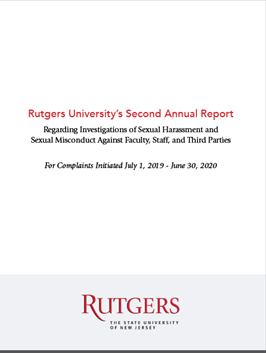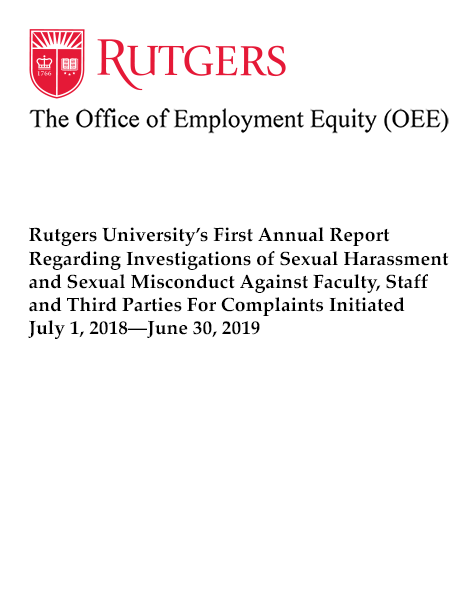Reports
The following reports address and include recommendations for the prevention of sexual harassment in higher education.
 Rutgers University’s Second Annual Report Regarding Investigations of Sexual Harassment and Sexual Misconduct against Faculty, Staff, and Third Parties for Complaints Initiated July 1, 2019–June 30, 2020
Rutgers University’s Second Annual Report Regarding Investigations of Sexual Harassment and Sexual Misconduct against Faculty, Staff, and Third Parties for Complaints Initiated July 1, 2019–June 30, 2020
The Office of Employment Equity (OEE) has developed an annual report to be shared with the university community that provides aggregate data on harassment, discrimination, and sexual misconduct in employment contexts. This report is OEE’s second annual response to the recommendations of the Rutgers universitywide Committee on Sexual Harassment Prevention and Culture Change.
 Rutgers Committee on Sexual Harassment Prevention and Culture Change Report
Rutgers Committee on Sexual Harassment Prevention and Culture Change Report
April 30, 2019
The universitywide Committee on Sexual Harassment Prevention and Culture Change, comprised of 45 faculty and staff members and students, has completed its collaborative work and has recommended creating new policies and providing additional procedures and resources to foster an environment free from sexual and gender-based harassment for every member of our Rutgers community. The recommendations in this report aim to strengthen Rutgers’ nationally recognized commitment to preventing harassment and sexual misconduct and providing significant resources to survivors of sexual harassment and assault.
The report of the National Academies of Sciences, Engineering, and Medicine (NAS) states that sexual harassment persists in higher education and much needs to be done to change how universities respond to it and to change the culture of academia. The NAS calls on academic institutions to reduce sexual harassment by making systemic cultural changes that demonstrate how seriously they take the issue, and to demonstrate that they are listening to and supporting those who speak up to report their harassment experiences.

The Office of Employment Equity (OEE) has developed an annual report to be shared with the university community that provides aggregate data on harassment, discrimination, and sexual misconduct in employment contexts. This report is OEE’s first annual response to the recommendations of the Rutgers universitywide Committee on Sexual Harassment Prevention and Culture Change.
 Changing the Culture to End Sexual Harassment: Working Group report to the Advisory Committee to the NIH Director (ACD)
Changing the Culture to End Sexual Harassment: Working Group report to the Advisory Committee to the NIH Director (ACD)
December 2019
Recommendations for addressing sexual harassment in NIH extramural grant programs: The Advisory Committee on Changing the Culture to End Sexual Harassment recently released its final report and recommendations to the director. Many of the recommendations are connected to ongoing work within the Action Collaborative; if enacted, these recommendations may require change to policies and practices at NIH-funded institutions. This includes, but is not limited to, publicizing outcomes of investigations and informing targets/affected individuals of the outcome of an investigation while protecting the identity of the target (Recommendation 1.2); requiring all new faculty hires to attest that they do not have findings of professional misconduct (including sexual harassment) and/or authorize reference checks (Recommendation 1.6); providing resources and support to targets (Recommendation 2.1); and requiring training for mentor/mentee relationships (Recommendation 3.3).
 Sexual Harassment of Women: Climate, Culture, and Consequences in Academic Sciences, Engineering, and Medicine
Sexual Harassment of Women: Climate, Culture, and Consequences in Academic Sciences, Engineering, and Medicine